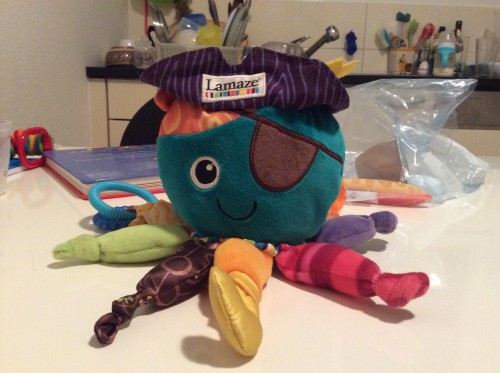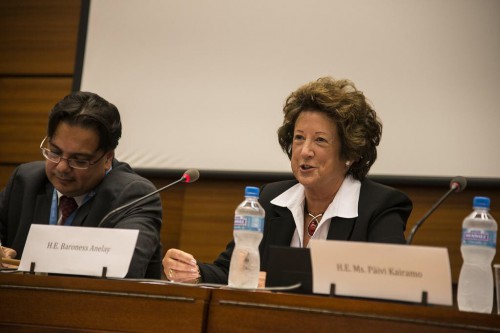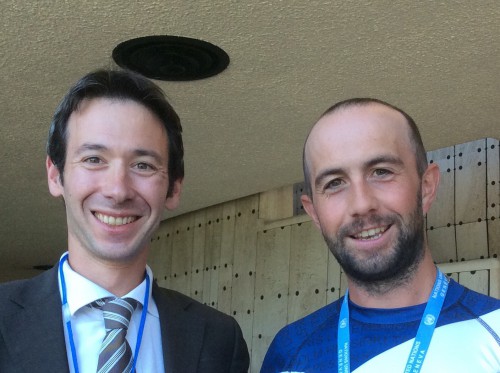23rd September 2014 Geneva, Switzerland
Nations United
It’s been an interesting week to be a Brit at the UN. No matter what else has been going on in the rest of the world, all anyone wanted to talk to me about was Scotland. Mostly people just wanted to hear my prediction of what the result was going to be, as though I have special soothsaying powers. I tried to invoke the spirit of Paul, the result-predicting world cup octopus through one of my baby daughter’s toys, but he wasn’t giving anything away. Both before and after the result was known diplomatic colleagues were universally positive about how well the British people had reacted to the referendum, and the example the UK had given about its democracy.

I spent a large part of the week working on the visit of the UK’s new Minister for Human Rights and the UN, Baroness Anelay who discussed the UK’s international priorities with senior UN figures and NGOs. At a packed event on Universal Periodic Review held with the Moroccan human rights Minister, she set out the what the UK has been doing to take forward its UPR recommendations over the last 2 years. It was encouraging to hear that many other states have also put measures in place to make sure UPR serves to bring about positive change between its four year cycles. The Minister made a strong impact on those she met and left us impressed by her commitment to engaging on the many issues which we cover at the Council.

There’s been plenty else going on at the Council this week, as delegates worked to finalise more than 30 resolutions before Thursday’s tabling deadline. The one attracting the most discussion is the resolution on Sexual Orientation and Gender Identity which Brazil, Colombia, Chile and Uruguay are leading. The resolution builds on the initial breakthrough resolution on this topic in 2011, led then by South Africa, which was the first time the Council had passed a resolution condemning discrimination and violence against LGBT people around the world. The outcome will say a great deal on whether member states are truly committed letting all individuals exercise their right to non-discrimination and equality before the law.
As Council colleagues will know it’s not possible to keep a track of all of the issues which come up and everyone ends up having their favourite topics. I always find reading someone else’s resolutions is a bit like looking at photos of other people’s kids. You make polite noises and try to show interest but you can never feel the same about someone else’s.
The biggest draw in week 2 of the Council was Monday’s panel discussion on the ‘protection of the family’. Many states had objected when this panel was set up in June due to the risk that this concept poses to the rights of individuals within the family and that it excluded diverse family forms like unmarried couples and single-parent families. During the panel, the majority of speakers drew attention to these concerns and expressed doubt about the idea of protecting the family through a human rights framework. Uruguay pointed out that in some states rapists currently go unpunished if they married the victim, while Chile pointed out that over 30% of children were born outside of marriage.
I was glad to meet Matthew McVarish (link) who is currently walking 10 000 miles through 32 European capitals to raise awareness about child sexual abuse. Matthew’s personal experience is inspiring. He is himself is a survivor of child sexual abuse who, as an adult, successfully brought charges in the UK against the family member responsible. This would not have been possible in many other countries where legal systems have a statute of limitations which block people from bringing criminal cases after a certain time period. Matthew is trying to get states change their legal systems to make this possible. He still has 4000 miles to go and I wish him well.

As anyone who knows me can testify I don’t get out much these days. But when I did actually make it out with my wife on Friday, it wasn’t a total break from thoughts of work. We ended up watching a film about a group of gay rights activists who supported the British coal miners during the long strike of 1984. Politics aside, it was an interesting reminder of how far the UK has come on combating LGBT discrimination during my own lifetime and something that gives me hope that many other counties will remove restrictive legislation and seek to combat violence against LGBT people in the future. Our babysitter’s curfew meant that we didn’t have time to go out partying afterwards as would have done in our younger days. But we did at least have time for a glass of Scotch.
Interesting reading as always. I attended the side event on the UPR. We need to see more events like that at the Human Rights Council. J.F.
Hello Bob. Great that you manged to end on a positive note. It is important to remember how much progress can be achieved in just one lifetime. Best wishes, Ursula